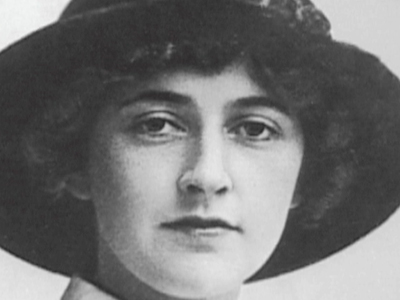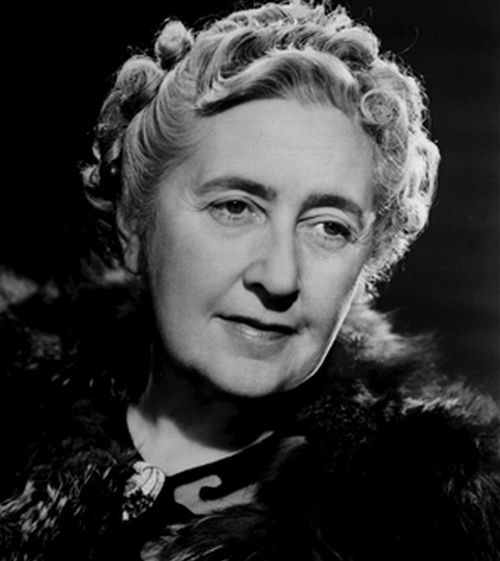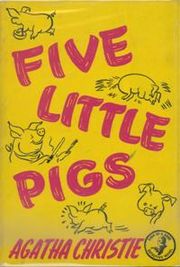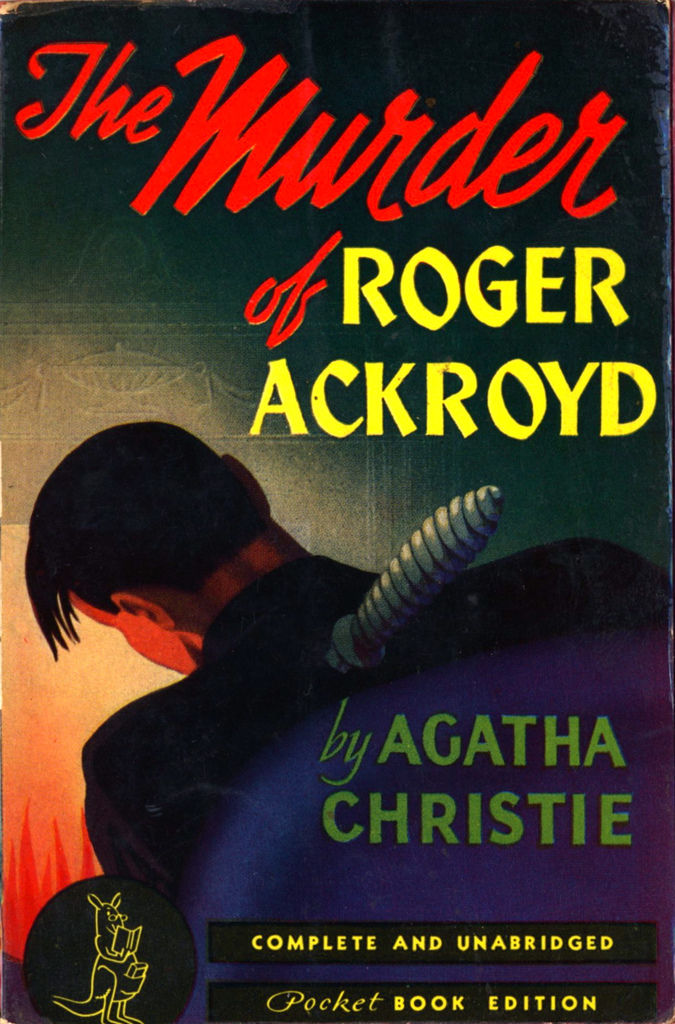Tuesday, July 28: Surprise Witness
DON’T INSULT the DAME
 Welcome back our irrepressible friend, Yoshinori ‘Todo, a regular on Dell Magazine’s web site, The Mystery Place, whom you’ll spot under the name Josh. He’s impossible not to like: He’s trustworthy, loyal, helpful, friendly, courteous, cheerful, kind, and the rest of the Boy Scout Law. He’s also knowledgable and chivalrous and part of his knowledge and chivalry extends to Agatha Christie. He has a genuine love for Dame Agatha and for that reason, we invite him back to Criminal Brief to discuss cool crimes in the heat of summer.
Welcome back our irrepressible friend, Yoshinori ‘Todo, a regular on Dell Magazine’s web site, The Mystery Place, whom you’ll spot under the name Josh. He’s impossible not to like: He’s trustworthy, loyal, helpful, friendly, courteous, cheerful, kind, and the rest of the Boy Scout Law. He’s also knowledgable and chivalrous and part of his knowledge and chivalry extends to Agatha Christie. He has a genuine love for Dame Agatha and for that reason, we invite him back to Criminal Brief to discuss cool crimes in the heat of summer.
The Amazing Agatha Christie
by Yoshinori Todo
It’s summer time. Are you looking for good mysteries to sink your teeth into? Books that baffle, confuse, and impress you, make you feel all kinds of emotions in between? Why don’t you give… Agatha Christie a try? That is, if you haven’t already devoured every one of her eighty masterpieces.
"Agatha Christie."
Just hearing this name gives me that familiar yet elusive tingle of anticipation that comes from knowing something spectacularly good is just around the corner. Yes, she has that kind of effect on me. She is what Steven Spielberg is to American cinema. What Stephen King is to the horror genre. What 5-times Oscar winner John Williams is to the world of film music. (And yes, these are all personalities whom I admire.)
Mind-bendingly complex puzzles– of course, this is the most obvious reason why so many remember and treasure Agatha Christie’s works. When you pick up one of her slim brightly-colored paperback novels, there’s always this sense of being at the mercy of a master manipulator. Someone who can outdeceive and bamboozle you like the best of all stage magicians. With Christie, the culprit is very often the really most unlikely person, as opposed to the obviously most unlikely person, if you know what I mean. And her forte lay not in the ingenious mechanical puzzles of the John Dickson Carr type, but in human puzzles. It’s always interesting to find out what the characters you have been led to care about are really thinking and feeling.
Contemporary critics and readers tend to be a trifle sniffy about Dame Agatha Christie. In my opinion, that’s unjustified, if understandable. Understandable because of what I have come to term the “Titanic effect.” When confronted with this kind of success (over 4 billion sold books in over 100 languages, outsold only by the Bible and Shakespeare), many otherwise level-headed critics and readers apparently see no other choice but to regard such achievement with suspicion, contempt, and yes, even outright hate. Or maybe it’s envy, I don’t know. But it’s almost like they are saying, “This isn’t normal, folks, there must be something seriously fishy here. She (or he) is a freak!”
However, I am rarely one to be influenced in my opinions by critics and reviewers (said he, as he turned to “The Jury Box”). To complain that Agatha Christie didn’t write more profound realist novels with more “substance”– whatever that means– seems to me as stupid as to criticize Edgar Allan Poe for not having written romances in the tradition of, say, Danielle Steel. That’s just not the kind of stories he wanted to write! Christie set out to write well-plotted, entertaining mysteries that would puzzle, confuse, and delight the reader with the famous “last chapter.” And if you ask me, she did it better than anybody else. People read her books to be entertained, to be wowed. And entertained and wowed they were, the statesmen and public workers and university professors and factory hands and deliquent teens and their well-meaning grandmothers and their best friends.
But it’s more than that. I venture to say that her success is based on the simple fact that she was a dazzlin gly accomplished fiction writer, period. In my opinion, she exceled in the following three areas (aside from the puzzles).
gly accomplished fiction writer, period. In my opinion, she exceled in the following three areas (aside from the puzzles).
1. Vivid, subtle characterizations
Some may disagree with me here, arguing that most of Christie’s characters are little more than cardboard figures who are moved around like pawns. I suspect they think so because, in the pinnacle of her career, she used to write with what seems like the greatest economy possible—not unlike Hemingway, as far as that goes. However, in a typical Christie novel you get to know more of the inner thoughts and dialogues, subtle facial expressions and general nuances of any given scene, than in most other novels of any kind.
2. Atmosphere
In the best of her books, there is an incredibly strong sense of atmosphere. Whether it be menacing or frivolous, oppressive or light-hearted, melancholy or happy, “voyeuristic” or sensual. And again, she managed to evoke atmosphere in her works without having to go on and on for pages of descriptive passages.
3. Being NOT a literary writer
And I’m using the word “literary” in the narrowest sense here. I think it was critical for her not to be too much of a literary writer in order to be this successful. She was more of a commercial writer, like Stephen King and John Grisham today. I think most literary writers are primarily concerned with how the words and sentences themselves affect the reader. Christie’s first concern was always how the characters and their actions and thoughts affect the reader. Every good writer of fiction should be concerned with both, of course, but I’m convinced that what’s important is where the focus lies.
There is a fine line there, and it should be recognized. Let me give you a for-instance. In the first chapter of And Then There Were None, this sentence can be found: “Nodding his head in gentle approval of his logic, Mr. Justice Wargrave allowed his head to nod…” Now, a writer who thinks of himself as “literary” would never allow himself to write such a sentence, finding it awkward and clumsy. He would at least substitute the second “nod” with something like “drop to his chest.” But I don’t think Christie was being clumsy here. On the contrary, it seems to me that, if the reader is totally immersed in the story (and not scrutinizing every sentence or paragraph for structural or stylish weaknesses), these quasi-word pictures are the most powerful way to make him or her see, having—subconsciously or not—the strongest immediate impact. It’s not the most obvious and easy way to say it; just the most effective. And the sentence above does indeed make the reader see the old judge nodding a few times in appreciation of his logic, before he nods his head slowly one final time as he falls asleep. This is just one example of many MANY, of course, and granted, it’s subtle and seemingly inconsequential, but I think I have a point. (On the other hand, I could be way off here, so tell me what you think!)
Here are 3 of my favorite Christie novels:
 Five Little Pigs: A British summer garden. There was a murder victim, an elderly irascible artist-painter, his young beautiful wife ravaged with grief, some family friends who were visiting from the neighboring estate. There was a sparkling little river nearby where little Angela was playing when the crime took place. And all morning, there was a palpable sense of doom in the air. All these images and memories . . . and Hercule Poirot is asked to solve the case which lies sixteen years in the past. Through the filter of memory, the events leading up to the tragedy are narrated by five people from five different angles, and Poirot’s “little grey cells” never functioned more brilliantly. One of Christie’s most realistic, complex, and poignant novels, characterized by an unusual depth of psychology. This is my all-time favorite Christie novel. (Note: Read the British HarperCollins edition! The American Berkley edition has been edited almost beyond recognition.)
Five Little Pigs: A British summer garden. There was a murder victim, an elderly irascible artist-painter, his young beautiful wife ravaged with grief, some family friends who were visiting from the neighboring estate. There was a sparkling little river nearby where little Angela was playing when the crime took place. And all morning, there was a palpable sense of doom in the air. All these images and memories . . . and Hercule Poirot is asked to solve the case which lies sixteen years in the past. Through the filter of memory, the events leading up to the tragedy are narrated by five people from five different angles, and Poirot’s “little grey cells” never functioned more brilliantly. One of Christie’s most realistic, complex, and poignant novels, characterized by an unusual depth of psychology. This is my all-time favorite Christie novel. (Note: Read the British HarperCollins edition! The American Berkley edition has been edited almost beyond recognition.)
 4.50 from Paddington: A few days before Christmas, a woman Christmas shopping in London is on her way back to the Village. She settles herself comfortably in the train, not knowing she is about to have the shock of her life. She glances out the window as another trail runs parrallel to hers, and what she sees makes her nearly faint. What did she see? (In fact, What Mrs. McGillicuddy Saw was the original American title.) I love Miss Marple. Charming, kindly, mettlesome– and meddlesome– elderly spinster with the twinkle in her china-blue eyes. She does some impressive deductive work here.
4.50 from Paddington: A few days before Christmas, a woman Christmas shopping in London is on her way back to the Village. She settles herself comfortably in the train, not knowing she is about to have the shock of her life. She glances out the window as another trail runs parrallel to hers, and what she sees makes her nearly faint. What did she see? (In fact, What Mrs. McGillicuddy Saw was the original American title.) I love Miss Marple. Charming, kindly, mettlesome– and meddlesome– elderly spinster with the twinkle in her china-blue eyes. She does some impressive deductive work here.
 Peril at End House: Fireworks! I remember this book mostly for fireworks. A little party standing on a lawn overlooking the British Riviera. They are in good spirits, drinks are served, fireworks burst in the sky. A few people run in and out of the house. Suddenly there is a loud bang, but this one’s different. There is some slight confusion. Then a scream is heard and people start taking notice. And on the lawn halfway between the cliff and the house, the body of a young girl lies wrapped in a luridly scarlet shawl.
Peril at End House: Fireworks! I remember this book mostly for fireworks. A little party standing on a lawn overlooking the British Riviera. They are in good spirits, drinks are served, fireworks burst in the sky. A few people run in and out of the house. Suddenly there is a loud bang, but this one’s different. There is some slight confusion. Then a scream is heard and people start taking notice. And on the lawn halfway between the cliff and the house, the body of a young girl lies wrapped in a luridly scarlet shawl.
 My Top 20 favorite Christie novels (in chronological order): Murder on the Links, The Murder of Roger Ackroyd, Peril at End House, Murder on the Orient Express, The ABC Murders, Cards on the Table, Death on the Nile, Appointment with Death, Hercule Poirot’s Christmas, And Then There Were None, Sad Cypress, Evil Under the Sun, Five Little Pigs, Crooked House, Sparkling Cyanide, A Murder is Announced, 4.50 from Paddington, Ordeal by Innocence, The Mirror Crack’d from Side to Side, Curtain: Poirot’s Last Case.
My Top 20 favorite Christie novels (in chronological order): Murder on the Links, The Murder of Roger Ackroyd, Peril at End House, Murder on the Orient Express, The ABC Murders, Cards on the Table, Death on the Nile, Appointment with Death, Hercule Poirot’s Christmas, And Then There Were None, Sad Cypress, Evil Under the Sun, Five Little Pigs, Crooked House, Sparkling Cyanide, A Murder is Announced, 4.50 from Paddington, Ordeal by Innocence, The Mirror Crack’d from Side to Side, Curtain: Poirot’s Last Case.
If you haven’t read any of these titles, run to your nearest bookstore (or library) now. Happy summer, everybody, and happy reading!




















Funny thing,I was just listening to Loreena McKennitt’s recording of “The Lady of Shalott” yesterday and that got me thinking of Christie’s “The Mirror Crack’d.” Certainly one of the cleverest murder motives I have ever read.
This is an excellent piece, Josh, and I agree with nearly everything you said. (I don’t think I’d let her off the hook on that double-nod sentence, however.) Christie could do about anything in the pure detective genre, including the occasional locked room–the problem and solution in HERCULE POIROT’S CHRISTMAS were worthy of John Dickson Carr. The present-day writers who patronize Christie know they can never approach her puzzle-spinning prowess but believe they compensate for that by their superiority in style, characterization, and theme–but, as you point out, it ain’t necessarily so.
Perhaps the stupidest thing I ever heard someone say was that Agatha Christie might have been a brilliant plotter, but that she was not a very good writer. Only someone who doesn’t understand that craft should be invisible could make such a dull-witted judgment.
If the essence of good writing is clarity of expression, she was absolutely one of the best that ever was.
Rob—Did you know that THE MIRROR CRACK’D (or at least the motive part) was based on the true-life experiences of American actress Gene Tierney, much like MURDER ON THE ORIENT EXPRESS was based on the Lincoln kidnapping case? I have to say, when I learned that, I was even more touched and affected by the novel.
Jon—Thank you, Jon, for the kind words! As far as HERCULE POIROT’S CHRISTMAS goes, yes, the locked-room problem IS quite well imagined and executed. However, what makes this novel so special and a perennial favorite of mine is the way Christie handled the family back story and family secrets. I don’t want to give anything away here, but you know what I’m talking about. That was done with a masterly and stupendous skill!
James—“If the essence of good writing is clarity of expression, [Agatha Christie] was absolutely one of the best that ever was.” Yes, I completely agree.
Agatha Christie pulled off having a number of beloved series characters including Tommy and Tuppence and Superintendent Battle, who are often over looked. At least I love them!
Granada TV produces a Christie series called Marple, which I haven’t seen but have heard complaints. Not only does the series include non-Miss Marple novels (i.e, Why Didn’t They Ask Evans?), but cobbles Superintendent Battle and T&T novels into Miss Marple stories.
I’m given to understand the series arbitrarily changes perpetrators and motives, adds and subtracts characters, and plays fast and loose with subplots. Apparently the producers are passionately fond of lesbians as they pop up in Marple.
Yes, they did that with movies too! The Marple movies “Murder at the Gallop” (1963) and “Murder Most Foul” (1964)are based on Poirot novels! I have never seen these, nor do I intend to. Except for ORIENT EXPRESS and the ones featuring Peter Ustinov as Poirot, I am not a big fan of Christie movies OR TV series.
… the Lincoln kidnapping case
I’m sure you meant the Lindbergh kidnapping.
—James Lindbergh Warren
(laughing out loud)
Sorry, yes, of course!
Thanks for reminding me of Tommy and Tuppence, two wonderful characters.
I was about 12 when an aunt told me to read “The Murder of Roger Ackroyd.” After all these years I still marvel at the shocking climax.
Dick, I agree– T&T were a lot of fun.
Yoshinori, I liked the Joan Hickson portrayal of Miss Marple; in fact, I thought her almost perfect. The director nicely captured the flavo(u)r of the characters and the series.
After Hickson died, the dull follow-on series with its 70s mod introduction was jolting.
The five Tommy and Tuppence books are the only Christie books I haven’t read. I don’t really know why.
Oh heck, I might start with THE SECRET ADVERSARY this weekend. . . .
Hmmm, Joan Hickson . . . yes, I’ve heard of her, but I don’t think I have ever seen her as Miss Marple (except maybe late at night, on some obscure old-movie channel). I have to get ahold of a few of those movies!
A few summers ago I got to read all the Miss Marple short stories in a few lazy, wonderful afternoons. Remember, the books also chronicle an England that is basicly gone now. I’ll also reccomend the Mr. Quin stories as my favorite (and hope you caught the article by Dawn Sova in the Feb-May ’09 Strand.)
Geeez! I could ramble here about, to borrow a line, “the grandest Dame of all.” Thanks, Josh, loved it!
Regarding Miss Marple: Joan Hickson was perfect for the role, and I think she played it in adaptations of all the novels. After Hickson, for my money, there was no need (artistic anyway) to recast the role. The films with Margaret Rutherford are fun, but in no way was that Miss Marple. Similarly, I think David Suchet definitively nailed Poirot. As for Tuppence and Tommy, I remember N OR M being a very good book, and the late one BY THE PRICKING OF MY THUMBS is pretty good, too. The TV version of Tuppence and Tommy, as I remember, was intolerably arch and cutesy.
After Hickson, for my money, there was no need (artistic anyway) to recast the role.
I concur.
Dame Agatha herself told Hickson that she would like to have her play Miss Marple, but didn’t live to see the performances. That’s too bad — Hickson’s portrayal was definitive as far as I’m concerned. Too many actresses seem to think that Miss Marple is a cute little old lady. She’s not.
Just to be a fly on the cupcake. I quite like the current Miss Marple TV adaptations. I don’t think of them as legit, however, but I do find them to be entertaining adaptations. And THE screen Miss Marple for me will always be Margaret Rutherford.
Yoshinori published something else today about Agatha Christie, mentioning two new Poirot stories:
http://www.themysteryplace.com/forum/messages.aspx?TopicID=7#post989
Thanks, Jeff!
As to Margaret Rutherford, I understand Christie herself wasn’t too pleased with the (performance of the) actress, but she dedidacted one of her novels—fittingly THE MIRROR CRACK’D FROM SIDE TO SIDE—to Rutherford nonetheless. I guess that was her way of saying, “Thank you.”
http://www.deliciousdeath.com/index.html
For fellow Christie fans, this site is invaluable. Not only does it contain a wealth of information, it displays thousands—maybe tens of thousands—of cover artwork of every Christie book published worldwide (I just love the British HarperCollins editions of the 90s; I grew up buying them, after all). This site is a genuine labor of love. I could spend hours browsing through it . . . and, as a matter of fact, sometimes I do.